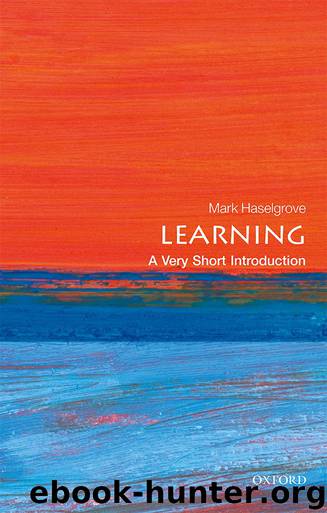Learning: A Very Short Introduction by Mark Haselgrove

Author:Mark Haselgrove
Language: eng
Format: epub
ISBN: 9780191512780
Publisher: OUP Oxford
Published: 2016-05-10T04:00:00+00:00
Chapter 4
Learning about space and time
Chapters 1 to 3 have described what learning is, what some of its contents are, and the mechanisms that permit it to happen. We have seen how a relatively simple concept—association—provides a good explanation for a number of features of learning across a variety of species and learning procedures. In the case of classical conditioning, it permits organisms to anticipate the world which they inhabit—to respond appropriately and, in the case of instrumental conditioning, to take control of their environment for material gains. However, without two key pieces of information this learning is, largely, useless. Consider the case of a detective who has associated the clues left behind by a jewel thief during his heists. From this, the detective may be able to predict that another heist will happen. These clues will not help our detective, however, unless she knows where the jewel thief is going to strike and when. The same logic applies to instances of learning in the animal kingdom. Take classical conditioning, for example. It is of little use to a rat if some aspect of the environment provides a signal for food if it does not also tell the rat where the food is going to be and when, so that the rat can be in the right place at the right time in order to exploit this learning.
In this chapter, I will describe how organisms learn about when and where things are going to happen. As will be seen, both of these aspects of learning have alternative explanations. Some psychologists have tried to explain space and time in terms of associations. However, other psychologists have attempted to explain timing and spatial learning by employing psychological versions of the things that allow us to time things and navigate in the real world—clocks and maps.
Download
This site does not store any files on its server. We only index and link to content provided by other sites. Please contact the content providers to delete copyright contents if any and email us, we'll remove relevant links or contents immediately.
Rewire Your Anxious Brain by Catherine M. Pittman(18625)
Talking to Strangers by Malcolm Gladwell(13334)
The Art of Thinking Clearly by Rolf Dobelli(10394)
Mindhunter: Inside the FBI's Elite Serial Crime Unit by John E. Douglas & Mark Olshaker(9301)
Becoming Supernatural by Dr. Joe Dispenza(8187)
Change Your Questions, Change Your Life by Marilee Adams(7720)
Nudge - Improving Decisions about Health, Wealth, and Happiness by Thaler Sunstein(7681)
The Road Less Traveled by M. Scott Peck(7576)
The Lost Art of Listening by Michael P. Nichols(7482)
Mastermind: How to Think Like Sherlock Holmes by Maria Konnikova(7306)
Enlightenment Now: The Case for Reason, Science, Humanism, and Progress by Steven Pinker(7292)
Win Bigly by Scott Adams(7175)
The Way of Zen by Alan W. Watts(6580)
Daring Greatly by Brene Brown(6492)
Big Magic: Creative Living Beyond Fear by Elizabeth Gilbert(5728)
Grit by Angela Duckworth(5580)
Ego Is the Enemy by Ryan Holiday(5395)
Men In Love by Nancy Friday(5219)
The Laws of Human Nature by Robert Greene(5139)
